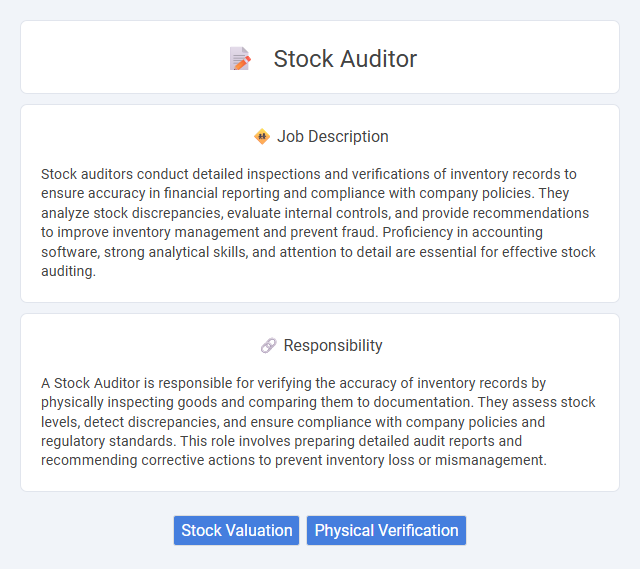
Stock auditors conduct detailed inspections and verifications of inventory records to ensure accuracy in financial reporting and compliance with company policies. They analyze stock discrepancies, evaluate internal controls, and provide recommendations to improve inventory management and prevent fraud. Proficiency in accounting software, strong analytical skills, and attention to detail are essential for effective stock auditing.
Individuals with strong attention to detail and analytical skills are likely suitable for a Stock Auditor role. People who thrive in structured environments and are comfortable working independently or in teams might find this job fitting their capabilities. Those less tolerant of repetitive tasks or stringent regulations may find the position less compatible with their preferences.
Qualification
A Stock Auditor must possess a degree in accounting, finance, or a related field, complemented by professional certifications such as CA, CPA, or CMA. Expertise in inventory management systems, auditing standards, and financial reporting is essential to accurately assess stock accuracy and compliance. Strong analytical skills, attention to detail, and proficiency in auditing software enhance the auditor's ability to identify discrepancies and improve stock control processes.
Responsibility
A Stock Auditor is responsible for verifying the accuracy of inventory records by physically inspecting goods and comparing them to documentation. They assess stock levels, detect discrepancies, and ensure compliance with company policies and regulatory standards. This role involves preparing detailed audit reports and recommending corrective actions to prevent inventory loss or mismanagement.
Benefit
A Stock Auditor job may offer significant benefits such as enhancing attention to detail and analytical skills, which are crucial for career advancement in finance. There is a probability of gaining exposure to various industries, increasing professional versatility and marketability. Job security could be robust due to consistent demand for inventory verification and compliance in organizations.
Challenge
A stock auditor likely faces the challenge of accurately verifying inventory quantities and values amidst discrepancies or incomplete records. Ensuring compliance with regulatory standards while managing time constraints could increase the complexity of the role. The probability of encountering irregularities or fraud makes attention to detail and analytical skills critical for success.
Career Advancement
Stock auditors play a crucial role in ensuring inventory accuracy and financial compliance within organizations. Career advancement opportunities include progressing to senior auditor roles, inventory control manager, or financial analyst positions by gaining expertise in audit procedures, regulatory standards, and inventory management systems. Certifications such as Certified Internal Auditor (CIA) and Chartered Accountant (CA) significantly enhance prospects for leadership roles in auditing and financial management.
Key Terms
Stock Valuation
Stock auditors specialize in verifying the accuracy and integrity of stock valuation by examining inventory records, physical stock counts, and accounting methods. They ensure compliance with accounting standards such as IFRS or GAAP, identifying discrepancies between book values and actual stock levels. Their role is critical for accurate financial reporting, risk mitigation, and maintaining investor confidence.
Physical Verification
Stock auditors specialize in verifying inventory by conducting thorough physical verification processes to ensure accuracy between recorded stock levels and actual quantities. They meticulously count, inspect, and document inventory assets, identifying discrepancies that could indicate shrinkage, theft, or recording errors. This role is critical in maintaining financial integrity and supporting accurate reporting in supply chain management.
 kuljobs.com
kuljobs.com